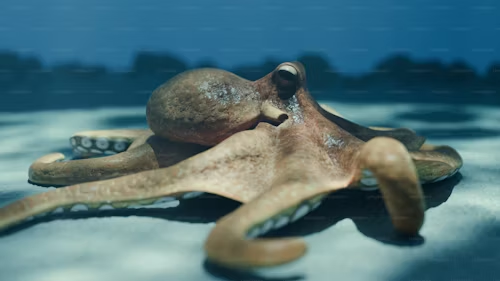
As a child, I was afraid of octopuses. When we went swimming at nearby Fairport Harbor, my father had to reassure me there were no octopuses in Lake Erie! But, over the years, my fear of octopuses morphed into fascination. That’s due to my exposure to some of the latest research on these highly unusual animals. Last year, for example, National Georgaphic won an Emmy for its three-part series The Secrets of the Octopus. This reflection is based largely on the article (by the same title) in the May 2024 issue of National Geographic. By the way, octopuses is the correct plural form of octopus–not octopi. Linguists now label octopi as “unacceptable.” Their explanation for why it is unacceptable is beyond the scope of this reflection! (In other words, it’s so complex I had a hard time understanding it!)
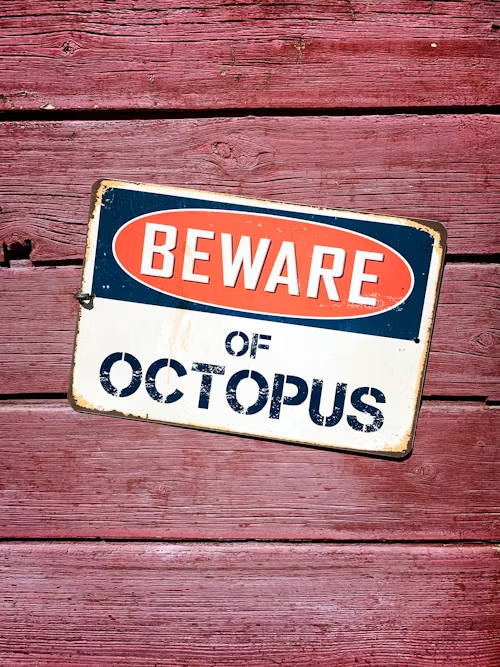
Let’s begin our exploration of the secrets of the octopus with a definition. My 1982 dictionary says the octopus “is a mollusk with a soft body and eight arms.” Technically speaking, that is no longer accurate. We now know that two of the so-called arms are really legs. (At your next party when the conversation is dull, just ask everyone, “How many arms does an octopus have?” Most likely they’ll all say, “Eight.” That’s when you prove them wrong and demonstrate just how smart you are!) The octopus is a member of the class cephalopoda which has been around for roughly 600 million years. We homo sapiens have been around approximately 300,000 years. So, who wins the “Been-Around-Longer” award? Certainly, not us! Now, let’s look at a few facts about the octopus.
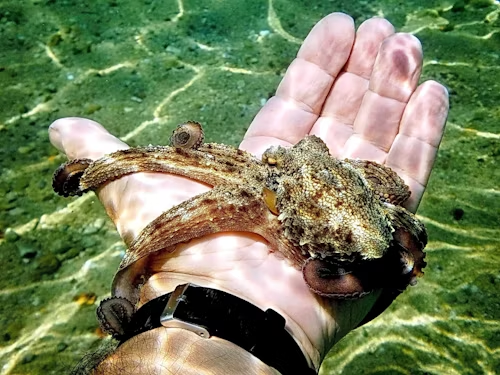
There are about 300 species of octopuses. Some live in coastal waters; others live in the depths of the ocean. The smallest octopus is less than an inch long and weighs less than a gram. The largest can be 14 feet long and weigh over 100 pounds. Everything said here about the octopus might not apply to all species of octopuses.
The octopus has no bones. Their beak, however, is made of cartilage. So any hole they can get their beak through, they can eventually get their whole body through. This makes them stellar contortionists and escape artists. (See short video at the end of this blog.)
The octopus has 3 hearts and a big brain. The two lateral hearts of the octopus pump blood to the gills while one central heart pumps blood to the rest of the body. For its size, the octopus has a big brain. In fact, their brain-to-body ratio is the largest of any invertebrate. Does this mean they’re highly intelligent? Keep reading to find the answer to that question.
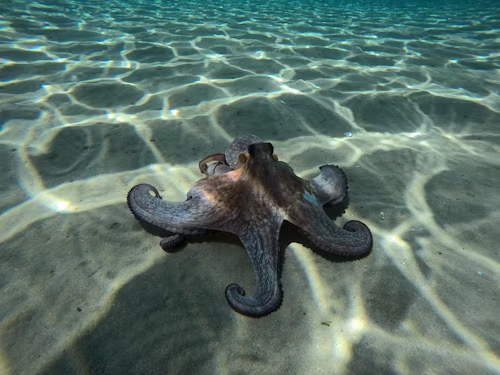
All octopuses are blue bloods. This does not mean all octopuses are descended from nobility or royalty. It means they all have blue blood. Literally. Their blood is blue because it is copper based. Our blood is red because it is iron-based.
The octopus is the ultimate master of camouflage. The octopus can change color, texture, and shape–all within seconds. If he is near rocks, for example, and spots a predator, he can instantly make himself look like a rock! If she is near some yellowish-greenish underwater plants, she can instantly turn yellowish-greenish and blend in with those plants. Sometimes the octopus transforms himself or herself into the shape and color of a fish that the other fish avoid–like the stingray! It’s awesome to behold! (Again, be sure to behold the video at the end.)
What about those tentacles? Some octopuses have over 200 suckers on each of its tentacles. Those suckers are amazingly powerful. A single sucker on a Giant Pacific octopus can lift 35 pounds! But those suckers can also smell and taste! (Imagine if you could smell and taste with your hands!)
What about their ink? The octopus can secrete a deadly black ink to confuse or kill prey or predators. This ink impairs the sight, taste, and smell of other fish. If fish get the ink into their gills, the ink suffocates them. Interestingly, the octopus’ ink is deadly even for themselves! Every time they squirt some ink, they have to quickly swim away in the opposite direction.
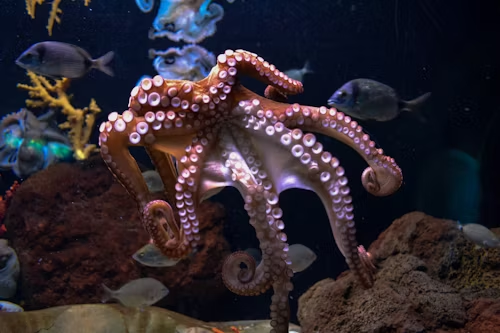
Reproduction is no honeymoon. Octopuses are ordinarily solitary–except when they fall in love. But their love-making can become very violent. (Spoiler alert: it doesn’t end well for the male.) First, the female is usually much larger than the male. In some species the female is 40,000 times the size of the male! (That 40,000 is NOT a typo. I checked that fact three times!) After fertilizing the female’s eggs, the male is often killed by the female. (Think: Black Widow–ala octopus!) Over days, weeks, and even months the female lays hundreds of fertilized eggs in a den and never leaves them. She is totally consumed with tending and guarding her eggs–so much so, she never takes a break, goes out for a stroll, gets her hair done, or even eats. Writes one researcher, “exhausted and depleted,” most mother octopuses die “once their brood is hatched.” So, reproduction is no honeymoon for the female octopus either.
Okay, but how smart are octopuses? The article in National Geographic says this: “There is no perfect way to gauge intelligence.” Most of us would agree–whether we’re trying to measure intelligence in the academic world, the sports world, or the political world…) “But,” continues the article, “neurons are a proxy for neurological complexity.” So how many millions of neurons do some animals have–including the octopus? Here’s a short list: Zebrafish (0.1 million)… mouse (71 million)… ferret (404 million)… octopus (500 million)… dog (2,250 million) human (86,000 million). (Remember, a human being made this chart!) But many researchers label the octopus “supersmart.” That’s because the octopus displays “a range of complex behaviors.” It can learn, retain knowledge for months, complete tricky tasks to get food, solve puzzles, use tools, escape mazes, untie knots, recognize human individuals, open jars and child-proof containers, and is incredibly curious.
And finally, the octopus also plays–which (as we all know) is always a sign of superior intelligence! (Have you played lately?)
As promised, here is a short video (4 mins.) by National Geographic titled “Octopuses 101.” It shows some of the astonishing behaviors of octopuses–including their mastery of contortion and camouflage. As a special treat, check out the second video too.
In their quest to understand other animals better, researchers have developed spy robotic animals that they place in the environment with real animals. Equiped with cameras and powers of movement and sometimes sound, their robots, which include whales, sharks, monkeys and octopuses, spy on the real animals. Here is a 4 min. video that shows the robotic octopus interacting with and “befriending” a real octopus.
For reflection:
Is there anything in today’s reflection that surprised or amazed you?
What do you think we human beings can learn from the octopus?
What does the octopus reveal to us about God, the Creator?
**********************************************************************
PS: Prayers… I will be giving a retreat this Tuesday at Bethany, our retreat center here. The theme of the retreat is “Hope.” The nine women participants are all in a Drug Rehab center. I look forward to being with them. Thank you for your prayerful support!
***********************************************************************
I invite you to respond below. My readers and I love hearing from you!






34 Responses
Your blog and the videos about octopuses are amazing! I never knew they had legs! And it’s so interesting that, while the octopus might have realized the robot was not an octopus, it nonetheless recognized a friend who had done it a favor to save its life and therefore deserved gratitude! Our Creator God is so amazingly awesome in the creatures that we still have yet so much to learn about and from.
Annie, You make a good point! The octopus knew the robot was NOT an octopus, and yet he reached out to the robot in gratitude. Melannie
Good morning, Melannie…
Good morning, all…
The Octopus! Just one more example of the manifold glory of our imaginative God! Highly recommend Sy Montgomery’s “The Soul of the Octopus.” She is a brilliant writer and a joyful soul. Thank you, Melannie!
John, Thank you for the book recommendation. There’s just not enough time in life to read all the wonderful and enriching books out there. That’s why I like to “imagine” that heaven has a huge library where we can curl up in a soft chair and read and read and read–whenever we feel like it! And what’s more, we’ll get a chance to meet and talk with the authors too! Melannie
Melannie, That is such a wonderful image of heaven!!! Thank you for that!
Chris, It’s always a treat hearing from a wonderful former student like you! I’m glad you saw a glimpse of “eternity” even in the octopus! Thank you! Melannie
This is amazing that your blog should come to me on the day that I finished reading, Remarkably Bright Creatures by Shelby Van Pelt. In this fiction novel, the plot personifies an octopus observing the humans that he meets in his public aquarium. Even though humans are supposed to be more intelligent, we don’t always use God’s gifts properly. Do we? Sometimes we’re too busy and need to be quiet with God. Thank you, Sr. Svoboda!
Karen, Thanks for yet another book recommendation. It sounds fascinating! Yes, we “intelligent homo sapiens” need time to be “quiet with God.” Thanks for that recommendation too! Melannie
I have a feeling that you will change 9 lives after your presentation on “hope.” Thank you for all you do Sister Melanie!
Mary, I don’t know about my changing nine lives by this retreat (that’s up to the Spirit!). But I do know that my being with these nine women, will change MY life. Thanks for the prayers! Melannie
I concur that octopuses have always somewhat creeped me out, however, this creature God created is a marvel. Having said that, it is beyond me awhy and how people like to eat octopus. Knowing somewhat there is a special way to eat those suckers, I think why? God created some many other species of seafood which are much more delightful and tasty to consume. Just food for thought!
Marilyn, I’m wondering if any of our readers has a fondness for eating octopus? I suspect food preferences are conditioned by availability, history, culture, and necessity. A while ago I interviewed a friend who is vegan– she eats no animials nor animal byproducts (milk, eggs, cheese, etc.) If anyone is interested in reading that interview, just go to the upper right this page and, in the search box, type in “interview with a hopeful vegan” and it should come up.
Thanks again for the reminder that our knowledge about these ancient créatures is everchanging. Praying for the nine soûls who will be on retreat with you!
Kathleen, Yes, there’s always new knowledge being acquired about our world. We must become life-long learners, not so? And thank you for the prayers! Melannie
I hope you’ll make time some day to view Netflix film documentary “My Octopus Teacher”. It’s fascinating and meditative
Eileen, I’ll add the title to my list. Thanks for the recommendation! Melannie
This creature at home in the sea is different in having three hearts with distinct functions, wonderfully flexible and adaptable, playful and short-lived. Like us in some ways, unlike us in others. But not to be feared in every event. With the humility and open-mindedness of a scientist and the trust given to us by God, we might explore extra-terrestrials who have lately sent signals from outer space and they were received by some human scientists. Martin Buber would advise us to consider such beings as “Thous”–personal beings like us. St.-Exupery, speaking as the fox in *The Little Prince*, would advise us to proceed with caution, tentatively and humbly.
George, I like the qualities you pointed out in the octopus: “flexible, adaptable, playful, short-lived.” And you made an interesting plink to “exploring extra-terrestrials”–recalling what Martin Buber said and what St. Exupery wrote… Much to reflect on. Thank you! Melannie
Sr Melannie,
A spiritual and educational blog! I learned so much from it and the responses.
Such a fun way to start the week. Thank you.
Prayers for Holy Spirit to open the hearts and minds of everyone attending the retreat.
Your retreats are a blessing.
Melanie, I’m so glad you found the reflection “fun.” I hoped it would be! Appreciate your prayers…. Melannie
Thank you for the reflection. It is interesting to see how wonderful God created the world. It is a reminder to me that with God all is possible
Br.Michael, And I imagine God has fun creating the world too! Our God is sooooooo imaginative! And soooooo playful! Thank you for writing! Melannie
I too would highly recommend “My Octopus Teacher.” It not only highlights the wonders of an octopus, but also has much to teach us about building relationships.
Kate, Two recommendations for the same movie… That’s usually a good sign! Thanks for commenting! Melannie
Sr. Kate,
I also found that movie powerful and charming. It told of the filmmaker’s journey as well as revealing the life of the octopus to us. Endearing.
I will pray for you on retreat. What a service you are providing those women!
Brandon, Thank you for your prayers. Tomorrow I will tell the women that the readers of my blog are praying for them. I’m sure that will mean a lot to them! Melannie
What an amazing article. I really learned so much. ( A lot of good info for Jeopardy!!!)
When I read pieces like this, it always astounds me that there are some people on this planet that do not believe in God, how can that be? I guess this also teaches us to go out and do our duty as disciples.
Good luck with your retreat and many prayers for you and your participants.
Toni, Learning something new can be fun, can’t it? Many people come to belief in a Creator by gazing upon and interacting with Creation! Thanks for your prayers! Melannie
Melannie: Thank you. The octopus is amazing. I second John’s recommendation of Sy Montgomery’s book, Soul of an Octopus and the Netflix documentary on the octopus recommended by another reader. And, I highly promote Albert Einstein’s quote: “Play is the highest form of research!”
Mary Ann Flannery, SC
Mary Ann, Thanks for seconding those book and film recommendations. You must really like octopuses! And the quote from Einstein is a “keeper” for sure! Melannie
Thank you Sr. Melannie, I so enjoy your reflections.
If you haven’t read it already, I suggest Remarkably Bright Creatures by Shelby Van Pelt. I found it to be a wonderful read.
Patricia, Another good book recommendation! Thanks for passing it on to us! Melannie
I know this will sound terrible, but I suppose using octopi as the plural of octopus would sound too much like baking mollusks under a crust. Before I help my self out, I’ll say I loved your essay on the octopuses (which for some reason suggests eight armed cats to me.) I also loved your essay in Give us this Day on St. Blaise. Thank you.